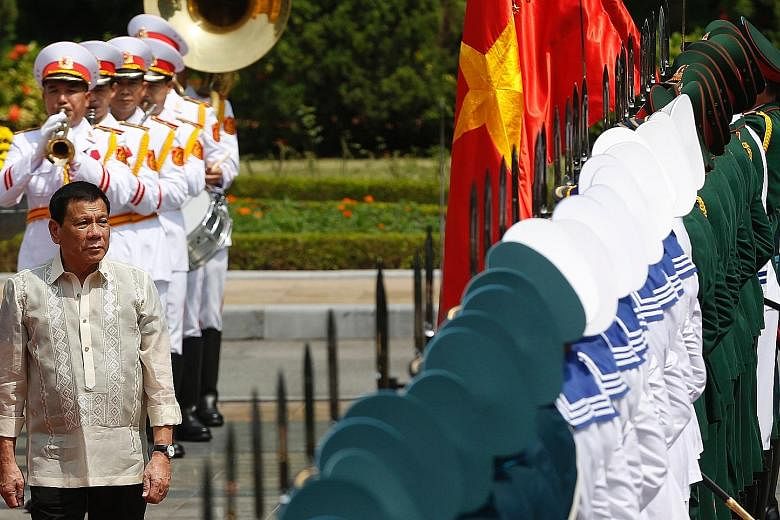President Rodrigo Duterte has said he will soon end joint military exercises with the United States, a move meant to put more distance between the Philippines and its longtime ally, and edge Manila closer to Beijing.
"I am serving notice now to the Americans… You are scheduled to hold war games again, which China does not want… This will be the last military exercise jointly, the Philippines-US. The last one," he told a raucous crowd of Filipinos at an upscale Hanoi hotel, where he kicked off his two-day visit to Vietnam on Wednesday.
He was referring to the Philippine-US Amphibious Landing Exercises (Phiblex) set to take place from Oct 4 to 12 in the Philippines. It follows the larger annual Balikatan exercises in April involving more than 8,000 personnel from both sides.
Mr Duterte said he would abide by the six-decade-old Mutual Defence Treaty between Manila and Washington.
"But I will establish new alliances for trade and commerce," he said, citing US rivals China and Russia.
Before departing for Hanoi on Wednesday, Mr Duterte said he would look to solidify a "strategic partnership" with Vietnam.
Yesterday, his aides told reporters that he and Vietnamese President Tran Dai Quang discussed the South China Sea dispute with China. They said Mr Duterte stressed that Manila preferred to hold one-on-one talks with Beijing, rather than via a broader forum like Asean.
-
DUTERTE'S FLIP-FLOPS
-
Philippine President Rodrigo Duterte has been touting his foreign policy as "independent" but it has not always been consistent or clear.
-
SOUTH CHINA SEA RULING
Mr Duterte has said that an arbitral tribunal's ruling that struck down China's claims to nearly all of the South China Sea would be at the heart of any negotiations between the two countries.Yet, in trying to curry favour with China, he has essentially set the ruling aside, saying only that he will raise it "at the appropriate time".
-
SCARBOROUGH SHOAL
In his election campaign speeches, he had promised to ride a jet ski to Scarborough Shoal, a disputed atoll that China has blockaded since 2012, and plant the Philippine flag there. -
Lately, however, he has ordered security forces to keep their patrols to within 12 nautical miles (22.2km) of Philippine shores.
Scarborough lies 220km off the main Philippine island of Luzon.
-
EJECTING US TROOPS
The Philippine leader had said he wanted US special forces operating in the strife-torn southern island group of Mindanao to leave, as they were complicating peace talks with Muslim rebels there.But his aides later clarified that he was just expressing concern for the Americans' safety.
-
LEAVING THE UN
Chafing at UN secretary-general Ban Ki Moon's criticisms of his anti-drug war, Mr Duterte threatened to take his country out of the UN, calling the esteemed body useless.
He later said he was only joking.
Raul Dancel
The leaders agreed that a code of conduct aimed at keeping the peace in the South China Sea would have to be concluded and implemented soon.
The Philippines and Vietnam had in the past shared a common position in opposing China's expansions in the South China Sea. China claims nearly all of the vital waterway. The Philippines, Vietnam, Malaysia, Brunei and Taiwan have competing claims.
Manila scored a major victory in July when an arbitral tribunal in The Hague ruled against China's claims. But Mr Duterte has refused to press that advantage, as he began pursuing a foreign policy meant to reduce Washington's influence and move Manila closer to Beijing.
In Hanoi, he said the conflict with China was "an imaginary thing".
The 71-year-old Mr Duterte has lashed out at the US since coming under heavy criticism for his war on drugs, a cornerstone of his government that has led to the deaths of more than 3,000 since he took office on June 30.
More recently, he threatened to eject US special forces operating in the country's troubled south.
In Hanoi on Wednesday, Mr Duterte declared that joint military drills with the US would cease.
He also reiterated his order for the Philippine military to stay away from joint patrols with the US Navy in the South China Sea.
Foreign Minister Perfecto Yasay later said the Philippines would go ahead with joint military exercises with the US next year, but review war games from 2018 onwards.
"If our agreements with the United States insofar as war games are concerned are there, and these should be done pursuant to the agreement that we have, that will be respected, that will continue," he said.
In Manila, Mr Duterte's spokesman Ernesto Abella told reporters: "There are no definite dates. There are no definite timelines. But it is part of the President's intention."
Defence ministry spokesman Arsenio Andolong, meanwhile, said in a statement that "all agreements and treaties with the US are still in effect. As to succeeding exercises, we will have to sit down with our US counterparts to discuss them".
US State Department spokesman John Kirby said in Washington that there "has been no official rendering" of Mr Duterte's plans.
"We've seen these comments. We've talked about them. But the bottom line is that we have significant security commitments with the Philippines. We are committed to meeting those commitments and to furthering this relationship," he told a news briefing.
Mr Duterte's disengagement with Washington contrasts with US efforts to expand naval engagement with Vietnam and Japan.
Tokyo indicated this month that it would step up activity in the South China Sea by carrying out joint training cruises with the US Navy. The US and Vietnam announced on Wednesday the start of their seventh annual naval engagement.

